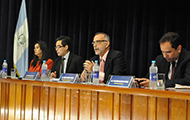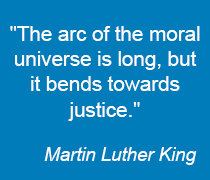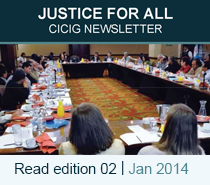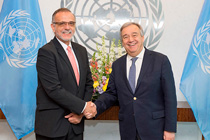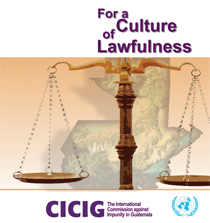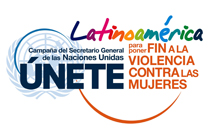PRESS RELEASE 045
SIXTH REPORT ON ACTIVITIES
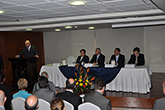 Guatemala, August 22, 2013. Further progress in criminal prosecutions and investigations, specialized offices at the Public Prosecutor’s Office (MP), continual skills transfer and institutional strengthening, increased awareness of justice institutions in fighting impunity and the ongoing support of international cooperation agencies to tackle this scourge—these are the main conclusions that can be drawn from the Sixth Report on Activities of CICIG, which covers the period stretching from September 2012 to August 2013.
Guatemala, August 22, 2013. Further progress in criminal prosecutions and investigations, specialized offices at the Public Prosecutor’s Office (MP), continual skills transfer and institutional strengthening, increased awareness of justice institutions in fighting impunity and the ongoing support of international cooperation agencies to tackle this scourge—these are the main conclusions that can be drawn from the Sixth Report on Activities of CICIG, which covers the period stretching from September 2012 to August 2013.
One of the main achievements of the Public Prosecutor's Office during 2012 was moving from a case-by-case investigation approach to a more strategic criminal prosecution approach, investigating and dismantling criminal gangs with operations in the country. This demonstrates—to a certain degree—the influence of the ongoing support provided by CICIG to the MP, through the Special Anti-Impunity Prosecutor's Bureau (FECI) and other bureaus, to tackle criminal structures. Through these efforts, tangible results have been achieved in relation to arrests, proceedings and extraditions, which were mainly linked to crimes such as extra-judicial killings, drug trafficking, fuel contraband, illegal adoptions, money laundering and extortion. Such efforts are testimony to the fact that impunity rates in the country can be reduced within the framework of the rule of law.
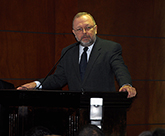 The relationship between CICIG and the Public Prosecutor’s Office (MP) has centered on helping enhance the capacities of its different sections through technical assistance, training and skills transfer. As a result of the implementation of recommendations made by CICIG in 2011 to create the Secretariat of Foreign Affairs and Cooperation, tangible international cooperation results have been seen, with an increase in the number of cases of joint legal assistance and extradition. CICIG has also contributed to strengthening and restructuring the Directorate of Criminal Analysis, which later became the Department of Financial Analysis. The human resources of the Directorate have quintupled, increasing from 16 in 2011 to 70 in 2013. Furthermore, an additional 100 officials will be incorporated by the end of 2013.
The relationship between CICIG and the Public Prosecutor’s Office (MP) has centered on helping enhance the capacities of its different sections through technical assistance, training and skills transfer. As a result of the implementation of recommendations made by CICIG in 2011 to create the Secretariat of Foreign Affairs and Cooperation, tangible international cooperation results have been seen, with an increase in the number of cases of joint legal assistance and extradition. CICIG has also contributed to strengthening and restructuring the Directorate of Criminal Analysis, which later became the Department of Financial Analysis. The human resources of the Directorate have quintupled, increasing from 16 in 2011 to 70 in 2013. Furthermore, an additional 100 officials will be incorporated by the end of 2013.
Security is one of the most important parts of guaranteeing the execution of the substantive work of the Public Prosecutor’s Office; therefore, CICIG continues to support the strengthening of a number of offices, such as the Witness Protection Office. As part of these efforts, 100% of a first project phase has been implemented, including the drafting and delivery of a diagnosis of staff assignment, role reassignment, operative structure reorganization, and procedure design and implementation. In addition, as part of the support provided to the Department of Security, great strides forward have been made in transforming the administrative and operative structure of the office, and risk levels have been identified and new security officials trained.
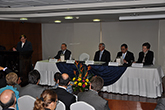 During the period in question, significant progress has been made in the investigation and preparatory phases of cases, in contrast to the "bottlenecking" experienced at intermediary and trial phases. In the five criminal cases that went to trial, five judgments were passed down and eighteen sentences were issued. The most influential factors in case progress in Guatemala are linked to the admission of CICIG into proceedings as a complementary prosecutor; the evaluation of technical evidence, expert witness evidence and statements; celerity of proceedings in a number of cases; and the award of constitutional appeals filed by CICIG to address misinterpretations of the law by certain judges.
During the period in question, significant progress has been made in the investigation and preparatory phases of cases, in contrast to the "bottlenecking" experienced at intermediary and trial phases. In the five criminal cases that went to trial, five judgments were passed down and eighteen sentences were issued. The most influential factors in case progress in Guatemala are linked to the admission of CICIG into proceedings as a complementary prosecutor; the evaluation of technical evidence, expert witness evidence and statements; celerity of proceedings in a number of cases; and the award of constitutional appeals filed by CICIG to address misinterpretations of the law by certain judges.
Irrespective of the advances in investigations and the convictions passed down, one of the main criminal prosecution errors in high-impact cases that has characterized the justice system in Guatemala is the judges’ failure to efficiently and promptly rule on requests filed by the Public Prosecutor’s Office (MP) as part of criminal proceedings (searches of premises, arrest warrants, telephone tapping, requests to banks, etc.). In addition, difficulties are continually faced when trying and punishing individuals. The main causes of these difficulties are the misinterpretation of the law by the Judiciary (Alaska and RENAP cases), the delays in proceedings (Rosalinda Rivera case), the alternative measures awarded to accused individuals, the modification of charges against accused (Amatitlán and Polochic cases) and the closure of criminal prosecution on the grounds of a lack of evidence (Pavón, Portillo and Amatitlán cases).
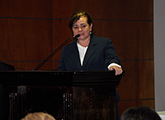 During the current period, eighteen new cases were opened in relation to human rights, civil and political issues, and the possible existence of illegal drug trafficking structures involved in corrupt acts, malfeasance of office, criminal association, extra-judicial killings, forced disappearance, drug trafficking, customs contraband, extortion, threats and murder.
During the current period, eighteen new cases were opened in relation to human rights, civil and political issues, and the possible existence of illegal drug trafficking structures involved in corrupt acts, malfeasance of office, criminal association, extra-judicial killings, forced disappearance, drug trafficking, customs contraband, extortion, threats and murder.
Skills transfer
CICIG continues to promote and implement strategic actions in accordance with its mandate and the commitments it forged with the State of Guatemala. During the past year, 236 officials have been trained in the areas of criminal investigation, financial and criminal analysis, and security and police prevention. In addition, 138 officials have benefitted from skills transfer. CICIG has also provided technical assistance to the Public Prosecutor's Office (MP), the Ministry of the Interior, the National Civil Police (PNC), the General Directorate of Criminal Investigation (DIGICRI), the Judiciary (OJ), the Attorney General of the Nation's Office (PGN), the Comptroller General's Office and the Superintendence of Tax Administration (SAT).
The support for better interinstitutional coordination between the Public Prosecutor’s Office (MP), the Ministry of the Interior, the units of the different prosecution bureaus, and the National Civil Police (PNC) is provided through the following means:
- Criminal investigation and prosecution: through the joint work with and continual training of prosecutors, assistant prosecutors, investigators, analysts, corporals and officers to draft investigation plans, conduct procedural activities, and hold analytical and police exercises.
- Security: through the joint work and rotation of contingents, reintegrating 10 officers into the Ministry of the Interior and selecting 16 recently graduated PNC officers, who joined CICIG to receive facility security and protection of persons training, after undergoing a training and selection procedure.
Results
The following results have been obtained through the efforts implemented by CICIG between September 2012 and August 2013:
ACTIVITIES |
QUANTITY |
Complaints received |
95 |
Open investigations |
31 |
Active investigations during the whole CICIG mandate |
68 |
a. Case investigated by FECI |
6 |
b. Closed cases |
2 |
c. Cases investigation in other prosecutor offices |
20 |
d. Cases under initial investigation |
3 |
Participation as a complementary prosecutor |
2 |
Participation not as a complementary prosecutor |
16 |
Judgments |
5 |
Accused parties |
22 |
a. with convictions |
18 |
b. acquitted |
4 |
Lifting of immunity hearings |
13 |
Administrative and criminal complaints against judges |
13 |
a. Linked to CICIG cases |
12 |
b. Linked to other cases |
01 |
Assistance with judicial statements |
122 |
Assistance with statements before the Public Prosecutor’s Office |
19 |
Support for judicial premises searches |
23 |
Support for judicial arrests |
55 |
Complaints against public officials
During the current period, CICIG has used its authority to file charges before the respective authorities against public officials or civil servants who, in the exercise of their duties, have committed alleged administrative or criminal offences. In addition, CICIG has paid special attention to individuals responsible for impeding it from exercising its duties or powers.
Affected body |
Position |
Crime |
No. of officials |
PNC |
Police Chief |
Customs contraband and criminal association |
3 |
Officer |
Customs contraband and criminal association |
Officer |
Customs contraband and criminal association |
OJ |
Judges |
Malfeasance of office |
16 |
SAT |
Customs Specialist of the Superintendence of Customs Authorities |
Customs fraud and criminal association |
01 |
|
Customs security specialist of the Superintendence of Customs Authorities |
Customs fraud, criminal association and use of false documents |
03 |
Local municipality |
Mayor of La Antigua (Guatemala) |
Fraud, extortion and criminal association |
01 |
Treasurer of La Antigua Guatemala |
Fraud, extortion and criminal association |
01 |
TOTAL: 25 |
Challenges
One of the main challenges faced by the State of Guatemala is the transformation of the legal system, with the aim of increasing its independence and creating a legal framework that facilitates the modification of the current procedures used to select judges. Furthermore, a more efficient administration of the judicial system would significantly contribute to reducing impunity levels in Guatemala over the coming years.
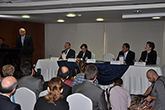 Another challenge is the professionalization of officials of the judicial branch, the Public Prosecutor’s Office (MP) and State security forces in order to improve the results of investigation, criminal prosecution and trial work. To ensure these efforts are not in vain, it will be necessary to approve judicial frameworks improving the conditions of public officials by providing them with better job stability, higher salaries, the respect and recognition of their rights and access to a security system for both the official and his or her family.
Another challenge is the professionalization of officials of the judicial branch, the Public Prosecutor’s Office (MP) and State security forces in order to improve the results of investigation, criminal prosecution and trial work. To ensure these efforts are not in vain, it will be necessary to approve judicial frameworks improving the conditions of public officials by providing them with better job stability, higher salaries, the respect and recognition of their rights and access to a security system for both the official and his or her family.
In order for the State to be sufficiently coordinated to tackle criminal organizations without CICIG support, a steely commitment and political intent will be necessary on the part of the institutions so as to implement the recommendations made since August 2010 to coordinate the State, in particular through elite prosecutor’s offices, international relations offices to exchange information in real time, a witness and victim protection system, scientific criminal investigation police, an information platform, special investigation methods and independent judges.
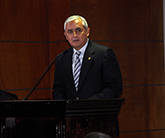 In order to consolidate the work to support institutional strengthening for counterparts, CICIG recently created an internal institutional strengthening office to better coordinate the implementation of the 2013-2015 CICIG Work Plan in the areas of technical support, training and skills transfer.
In order to consolidate the work to support institutional strengthening for counterparts, CICIG recently created an internal institutional strengthening office to better coordinate the implementation of the 2013-2015 CICIG Work Plan in the areas of technical support, training and skills transfer.
The continued political support and financial backing that donor countries have provided to CICIG since its inception are the fruits of the political efforts of the United Nations and the State of Guatemala, along with the spirit and good will of partner countries committed to the peace accords, human rights and triumphing over impunity in Guatemala. This has allowed CICIG to be independent in fulfilling its mission, as well as benefitting from confidence shown towards its work by the international community.


